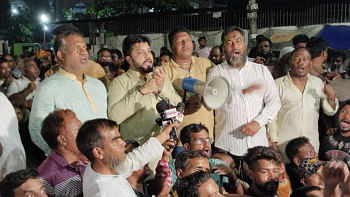We must preserve historical documents

We are disappointed to learn about the poor condition in which many historical documents are at the Bangladesh National Archives. While the state-run organisation is supposed to preserve our history through collecting and protecting records of historic value – newspapers, books, magazines, microfilm rolls, etc. – and to help researchers and readers to study and learn from them, it has been failing to live up to that mandate. According to a report by Prothom Alo, many of these documents are on the verge of destruction because they were not preserved properly, following the scientific method. Reportedly, the institution could not do anything significant in the last 50 years due to structural weaknesses, inefficiency and lack of manpower.
The National Archives, situated in the capital's Agargaon area, has many rare historical records, including a report prepared by the Famine Commission on the terrible famine of Bengal-Bihar-Odisha in 1896. A copy of the report that has been preserved there is no longer in a readable condition, with the papers breaking down in pieces with a slight touch. There are many other authentic documents of important historical events that have been kept there, such as the maps of the Battle of Plassey, records of the Agartala Conspiracy Case, etc. – but those are also in a vulnerable state. What is more frustrating is that there are hardly any important documents on our War of Liberation. Due to the weakness of the preservation system, much of the 90 million pages of documents that are kept there is being lost.

Why has the situation turn out like this? Do we not care about preserving our history, particularly the history of the Liberation War? If we do, why are there no important documents related to this? Why is the process of accessing existing documents so cumbersome? Reportedly, researchers cannot access multiple documents at one time, and the charge for copying the documents is also high. What is the point of keeping so many important national documents if they cannot be accessed by those needing them? Why are the documents – which are in a fragile condition – not being digitised? The National Archives authorities must answer these questions.
The Directorate of Archives and Libraries was established in 1972 under the leadership of Bangabandhu Sheikh Mujibur Rahman to preserve our national history, culture and heritage. And the Bangladesh National Archives Act 2021 was passed last year with the same goal. According to the Act, no historical record can be destroyed, and every record has to be archived.
If the way the National Archives authorities are doing their job currently does not change, the nation will soon lose many important historical documents that offer vital proof of events that define us as a nation. We cannot let that happen. We urge the authorities concerned to take proper steps to preserve whatever historic documents are left with them.

 For all latest news, follow The Daily Star's Google News channel.
For all latest news, follow The Daily Star's Google News channel. 




Comments